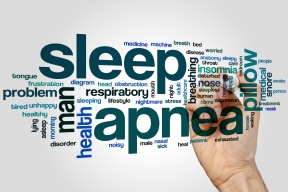Sleep Apnea May Lead to Health Problems
From an interview with
Dr. Marwan Elya
McLeod Critical Care Specialists
One in five adults suffer from some form of sleep apnea, a condition in which one repeatedly stops breathing when asleep. When someone stops breathing, oxygen levels drop, and the body releases stress hormones. Because several apnea episodes happen each night, the high stress levels can lead to high blood pressure. Untreated, sleep apnea can lead to many other serious conditions, including stroke.
Snoring is common, but not all people who snore have sleep apnea. An overnight sleep study is the gold standard test to confirm sleep apnea. The McLeod Sleep Clinic provides diagnosis and management of sleep disorders. Patients consult with and undergo evaluation by a sleep specialist.
What happens during a sleep study?
After you arrive at the sleep center (usually in the evening), a technician will apply small sensors to your head and body with adhesive. While you slumber in a high-tech sleep lab that looks like a comfortable hotel room, the technician in a nearby room records your brain activity and selected information from your body. Together, this data reveal a detailed picture of your unique sleep patterns, including how much time you spend in light and deep stages, whether you’re receiving enough oxygen, how often you awaken (even slightly), and whether sleep is disrupted by factors such as arm and leg movements.
A sleep study produces hundreds of pages of information about your night in the sleep lab. It will give your doctor the big picture about your sleep, plus lots of important details that may help prevent future health problems, such as hypertension, heart rhythm problems, increased plaque build-up in your arteries, and even a stroke or heart attack.
Talk to your primary care physician to see if a sleep study is right for you.
-
McLEOD REGIONAL MEDICAL CENTER FLORENCE
843-777-2000 -
McLEOD DARLINGTON
843-777-1100 -
McLEOD DILLON
843-774-4111 -
McLEOD LORIS
843-716-7000 -
McLEOD SEACOAST
843-390-8100 -
McLEOD CHERAW
843-537-7881 -
McLEOD CLARENDON
803-433-3000



-
McLEOD REGIONAL MEDICAL CENTER FLORENCE
843-777-2000 -
McLEOD DARLINGTON
843-777-1100 -
McLEOD DILLON
843-774-4111 -
McLEOD LORIS
843-716-7000 -
McLEOD SEACOAST
843-390-8100 -
McLEOD CHERAW
843-537-7881 -
McLEOD CLARENDON
803-433-3000
 Find a Doctor
Find a Doctor  Locations
Locations  Services
Services 